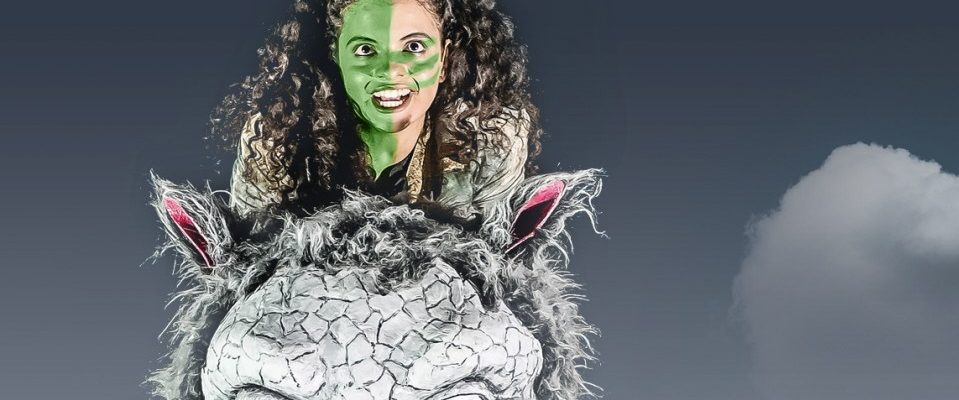Thousands of children and older people have already ridden the lucky dragon. They clung to Fuchur’s white mane and whizzed through the clouds – whether in their imagination while reading the novel “The Neverending Story” by Michael Ende or in the Bavaria Filmstudios, where visitors were previously allowed to reenact the heavenly scene from the film on guided tours. But nobody flies on the gentle monster like Leyla Bischoff. She swings onto his neck and is catapulted four meters into the air, going up and down, back and forth like a roller coaster ride, while she talks to her faithful companion.
Leyla Bischoff is in the ensemble of the Salzburg State Theatre, she studied at the Zerboni drama school in Munich, but there was hardly any preparation for her role in “The Neverending Story”. She plays Atreyu, here as an androgynous heroic figure with half of her face painted green, she moves the dragon’s mouth with one arm in lip-sync with what the down-to-earth actor is saying, and is properly shaken up. For this “flying experience”, as he calls it, the Salzburg artistic director and director Carl Philip von Maldeghem and his workshop manager developed a TÜV-certified crane with a safety system suitable for a fairground, which makes the camera crane used in the Bavaria Studios for the filming look old.
“The Neverending Story” as a play is a new experience. Von Maldeghem “devoured the book” but never saw the 1984 film directed by Wolfgang Petersen. “I didn’t want the film world to overwhelm the images in my head,” says the director, born in 1969. Michael Ende’s novel from 1979 was one of the key novels of his youth: “Like so many of my generation, I had the impression that that’s just written for me. It was about the seductive possibility of being able to dive into a fantasy world and experience adventure directly through a book.”
Faster than the viewer would like, the horse Artax (Tina Eberhardt) sinks into the swamps of sadness. Hero Atreyu (Leyla Bischoff) can’t help.
(Photo: Anna-Maria Loeffelberger)
Perhaps this paved the way for him to create his own worlds in the theatre; In any case, the youthful imprint made him immediately hooked, even before “The Neverending Story” was on the play market. And that took quite a while. Although there was already an audio book in 1980 and then several radio plays, after Ende’s death in 1995 a ballet was published (1999) and an opera (2004), but there was no official, licensed stage version. “Many wanted to make all sorts of things out of the material,” explains von Maldeghem, “a number of scripts were created. But Ende’s heirs didn’t want any of that.” They were only fascinated by the adult, psychological version that the dramaturg and playwright John von Düffel (Thalia Theater, Deutsches Theater Berlin) had come up with in 2021, and they let him do it alone.
The director of Maldeghem expressed his interest very early on – and convinced John von Düffel to let the Austrian premiere play in Salzburg. Because as Ende did not see himself as a children’s book author (“I write for the child in us all”) and as von Düffel had not created the play as children’s theater, he wanted to put it on the evening program. Just like the Deutsches Theater in Munich, where this production “from the age of twelve” can now be seen for the first time in Germany – in the city where the Garmisch-based Ende lived for a long time and wrote his first play in 1946 (“Because the hour is pressing”) ) and studied at the acting school of the Kammerspiele in 1948.
New friends: Bastian (Aaron Röll) meets the characters of his imagination. Many creatures are represented with puppets. Richard Panzenböck, the former ORF puppet director, trained the ensemble of the Salzburg State Theater.
(Photo: Anna-Maria Loeffelberger)
It is now a small theatrical miracle: The 480-page long interlaced story of the bullied boy Bastian Balthasar Bux, who reads a book about the hero Atreyu’s struggle for the kingdom of fantasies, in which he himself is then drawn as the main character, is a two-hour long become a piece. The film made it too easy for itself and mainly told the adventure part with Atreyu’s heroic journey. Von Düffel also tells the second psychological part, which for Maldghem is more theatrical: the book reader Bastian loses himself in fantasies. “There you see a person who suddenly gets hold of power and who changes extremely through his creative freedom, who betrays his friends and principles.” After the hero’s journey in the first part, this is “the next step in a developmental novel” after the break, the “more human story where the going gets tough”.
Of course, in the theater too, the book with the entwined snake on the cover is the seed of everything, in the sense of “In the beginning was the word”. Everything emerges from the black stage, a point of light. Von Düffel had the great identification-creating idea that Bastian didn’t take refuge in an antiquarian bookshop, but instead went straight to the theater. Here he meets the gray Mr. Koriander, not a bookseller, but a prompter.
The figures also speak to the audience and together with the audience create all the well-known places of fantasies, sometimes with old theater tricks, sometimes just as an abstract sound and video space, from the swamps of sadness to the ivory tower to the old imperial city. And everyone is there, the childlike empress in a ring of air, the rock biter, the snail, Artax the horse, the lion, the werewolf, the pesky slobs. Some are actors, some are puppets, some like the dragon Fuchur a mixture of both. Theatrical magic that leaves enough room for the audience to let their imagination run wild.
The Neverending Story, Deutsches Theater Munich, June 21 to 25, Wed. – Fri. 7.30 p.m., Sat. 3 p.m. & 7.30 p.m., Sun. 2.30 p.m., Schwanthalerstr. 13, www.deutsches-theater.de

